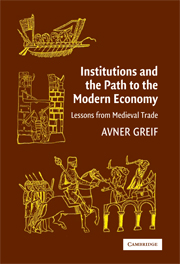Book contents
- Frontmatter
- Contents
- Abbreviations
- Preface
- I Preliminaries
- II Institutions as Systems in Equilibria
- III Institutional Dynamics as a Historical Process
- IV The Empirical Method of Comparative and Historical Institutional Analysis
- V Concluding Comments
- Appendixes
- References
- Index
- POLITICAL ECONOMY OF INSTITUTIONS AND DECISIONS
II - Institutions as Systems in Equilibria
Published online by Cambridge University Press: 05 September 2012
- Frontmatter
- Contents
- Abbreviations
- Preface
- I Preliminaries
- II Institutions as Systems in Equilibria
- III Institutional Dynamics as a Historical Process
- IV The Empirical Method of Comparative and Historical Institutional Analysis
- V Concluding Comments
- Appendixes
- References
- Index
- POLITICAL ECONOMY OF INSTITUTIONS AND DECISIONS
Summary
Definitions direct analytic attention and confine the scope of an empirical study; conducting a study requires an analytical framework. An analytical framework is required to reveal the conditions under which a particular institution is effective in generating a particular behavior, to expose causal relationships, to generate predictions, and to evaluate arguments. An analytical framework is particularly important in studying institutions, because beliefs and norms are unobservable.
Central to the analytical framework used here is classical game theory. Because the proof is in the pudding, this book contains five empirical studies that attest to its usefulness in studying institutions as defined here. These studies use an empirical method that combines detailed contexual knowledge of the situation and its history with explicit, context-specific modeling. This case study method uses contexual knowledge to develop a conjecture regarding the relevance of a particular intertransactional linkage and the related institution. It then uses an explicit (and in this work) game-theoretic model to evaluate this conjecture. This empirical method is employed in all the historical analyses presented in this book. It is elaborated on in Part IV.
The empirical studies presented here consider the institutional foundations of markets. Doing so departs from a long tradition in institutional analysis that goes back to Adam Smith and considers markets as primitives that need not be explained. According to this view, markets emerge spontaneously when and where there is an opportunity for profitable exchange. As O. Williamson put it, “in the beginning there were markets” (1975, p. 20).
- Type
- Chapter
- Information
- Institutions and the Path to the Modern EconomyLessons from Medieval Trade, pp. 55 - 57Publisher: Cambridge University PressPrint publication year: 2006



